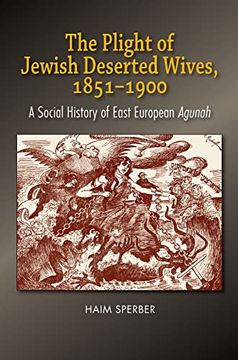Share
The Plight of Jewish Deserted Wives, 1851-1900: A Social History of East European Agunah (in English)
Haim Sperber
(Author)
·
Liverpool University Press
· Paperback
The Plight of Jewish Deserted Wives, 1851-1900: A Social History of East European Agunah (in English) - Sperber, Haim
$ 68.57
$ 85.71
You save: $ 17.14
Choose the list to add your product or create one New List
✓ Product added successfully to the Wishlist.
Go to My WishlistsIt will be shipped from our warehouse between
Thursday, June 20 and
Friday, June 21.
You will receive it anywhere in United States between 1 and 3 business days after shipment.
Synopsis "The Plight of Jewish Deserted Wives, 1851-1900: A Social History of East European Agunah (in English)"
Agunot (Agunah, sing., meaning anchored in Hebrew) is a Jewish term describing women who cannot remarry because their husband has disappeared. According to Jewish law (Halacha) a woman can get out of the marriage only if the husband releases her by granting a divorce writ (Get), if he dies, or if his whereabouts is not known. Women whose husbands cannot be located, and who have not been granted a Get, are considered Agunot. The Agunah phenomenon was of major concern in East European Jewry and much referred to in Hebrew and Yiddish media and fiction. Most nineteenth-century Agunot cases came from Eastern Europe, where most Jews resided (twentieth-century Agunot were primarily in North America, and will be the subject of a forthcoming book). Seven variations of Agunot have been identified: Deserted wives; women who refused to receive, or were not granted, a Get; widowed women whose brothers-in-law refused to grant them permission to marry someone else (Halitza); women whose husbands remains were not found; improperly or incorrectly written Gets; women whose husbands became mentally ill and were not competent to grant a Get; women refused a Get by husbands who had converted to Christianity or Islam. The book explores the reasons for desertion and the plight of the left-alone wife. Key is the change from a legal issue to a social one, with changing attitudes to philanthropy and public opinion at the fore of explanation. A statistical database of circa 5000 identified Agunot is to be published simultaneously in a separate companion volume (978-1-78976-167-2).
- 0% (0)
- 0% (0)
- 0% (0)
- 0% (0)
- 0% (0)
All books in our catalog are Original.
The book is written in English.
The binding of this edition is Paperback.
✓ Producto agregado correctamente al carro, Ir a Pagar.

